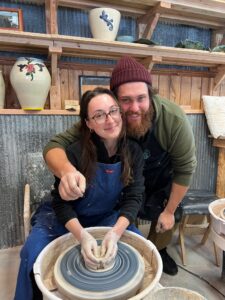How Pottery Skills Enhance Practical Life Abilities
Pottery isn’t just about shaping clay – it’s about shaping lives. As pottery students embark on their creative journey, they not only develop artistic skills but also cultivate a range of practical abilities that extend far beyond the studio walls. Let’s explore how learning to throw pottery on the wheel, hand-build pottery, mix glaze, and carve clay can help pottery students build practical skills in other areas of life.
Fine Motor Skills and Hand-Eye Coordination
Pottery requires precision and dexterity, honing fine motor skills and hand-eye coordination in the process. As students manipulate clay on the pottery wheel or sculpt intricate details by hand, they refine their ability to control and manipulate objects with precision. These skills translate into everyday tasks such as writing, typing, cooking, and crafting, enhancing overall manual dexterity and coordination.
Patience and Persistence
Pottery is a labor of love that requires patience and persistence to master. From centering clay on the wheel to waiting for pieces to dry and firing them in the kiln, pottery teaches students the value of patience and perseverance in the face of challenges. These qualities are essential not only in the studio but also in all aspects of life, from pursuing personal goals to navigating professional challenges.
Creativity and Problem-Solving
Pottery is an art form that encourages creativity and innovation, challenging students to think outside the box and explore new possibilities. Whether it’s experimenting with different forms and textures or troubleshooting glaze defects, pottery students learn to approach problems with a creative mindset and find unique solutions. These problem-solving skills are invaluable in all areas of life, from tackling everyday challenges to navigating complex problems in the workplace.
Attention to Detail and Focus
Pottery requires a keen attention to detail and the ability to focus on the task at hand. From shaping precise forms on the wheel to meticulously carving intricate designs, pottery students learn to pay close attention to the finer points of their work. This heightened focus and attention to detail carry over into other areas of life, from studying for exams to completing work assignments with accuracy and precision.
Time Management and Organization
Pottery is a multifaceted process that requires careful planning, organization, and time management. From scheduling studio time to coordinating glaze firings and kiln cycles, pottery students learn to juggle multiple tasks and deadlines with efficiency and grace. These organizational skills are transferable to all aspects of life, from managing household chores to balancing work and personal commitments.
Resilience and Adaptability
Pottery is a medium that teaches students to embrace failure as an essential part of the learning process. From collapsed forms on the wheel to cracked pieces in the kiln, pottery students learn to accept setbacks with resilience and adaptability, turning mistakes into opportunities for growth and learning. This resilience and adaptability are invaluable life skills, helping students navigate the ups and downs of life with grace and resilience.
Conclusion: Beyond Clay
Learning pottery isn’t just about creating beautiful objects – it’s about developing practical skills that extend far beyond the studio. From fine motor skills and patience to creativity and problem-solving, pottery teaches students a wide range of abilities that enhance their lives in profound ways. So, let us celebrate the transformative power of pottery to build practical skills and empower students to thrive in all areas of life.

